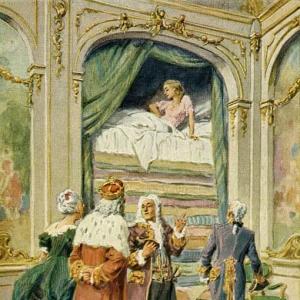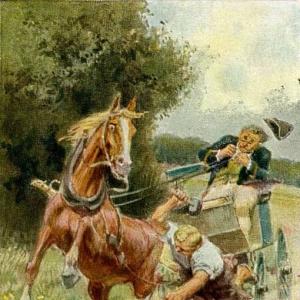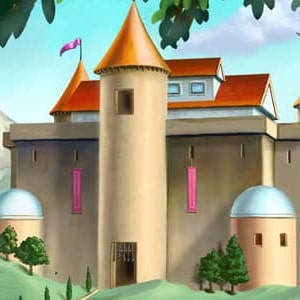Reading time: 15 min
Attention: This is a scary story.
There were once on a time a king and a queen who lived happily together and had twelve children, but they were all boys. Then said the King to his wife, „If the thirteenth child which thou art about to bring into the world, is a girl, the twelve boys shall die, in order that her possessions may be great, and that the kingdom may fall to her alone.“ He caused likewise twelve coffins to be made, which were already filled with shavings, and in each lay the little pillow for the dead, and he had them taken into a locked-up room, and then he gave the Queen the key of it, and bade her not to speak of this to any one.
The mother, however, now sat and lamented all day long, until the youngest son, who was always with her, and whom she had named Benjamin, from the Bible, said to her, „Dear mother, why art thou so sad?“ – „Dearest child,“ she answered, „I may not tell thee.“ But he let her have no rest until she went and unlocked the room, and showed him the twelve coffins ready filled with shavings. Then she said, my dearest Benjamin, thy father has had these coffins made for thee and for thy eleven brothers, for if I bring a little girl into the world, you are all to be killed and buried in them.“ And as she wept while she was saying this, the son comforted her and said, „Weep not, dear mother, we will save ourselves, and go hence.“
But she said, „Go forth into the forest with thy eleven brothers, and let one sit constantly on the highest tree which can be found, and keep watch, looking towards the tower here in the castle. If I give birth to a little son, I will put up a white flag, and then you may venture to come back, but if I bear a daughter, I will hoist a red flag, and then fly hence as quickly as you are able, and may the good God protect you. And every night I will rise up and pray for you — in winter that you may be able to warm yourself at a fire, and in summer that you may not faint away in the heat.“
After she had blessed her sons therefore, they went forth into the forest. They each kept watch in turn, and sat on the highest oak and looked towards the tower. When eleven days had passed and the turn came to Benjamin, he saw that a flag was being raised. It was, however, not the white, but the blood-red flag which announced that they were all to die. When the brothers heard that, they were very angry and said, „Are we all to suffer death for the sake of a girl? We swear that we will avenge ourselves!– wheresoever we find a girl, her red blood shall flow.“
Thereupon they went deeper into the forest, and in the midst of it, where it was the darkest, they found a little bewitched hut, which was standing empty. Then said they, „Here we will dwell, and thou Benjamin, who art the youngest and weakest, thou shalt stay at home and keep house, we others will go out and get food.“ Then they went into the forest and shot hares, wild deer, birds and pigeons, and whatsoever there was to eat. This they took to Benjamin, who had to dress it for them in order that they might appease their hunger. They lived together ten years in the little hut, and the time did not appear long to them.
The little daughter which their mother the Queen had given birth to, was now grown up. She was good of heart, and fair of face, and had a golden star on her forehead. Once, when it was the great washing, she saw twelve men’s shirts among the things, and asked her mother, „To whom do these twelve shirts belong, for they are far too small for father?“ Then the Queen answered with a heavy heart, „Dear child, these belong to thy twelve brothers.“ Said the maiden, „Where are my twelve brothers, I have never yet heard of them?“ She replied, „God knows where they are, they are wandering about the world.“ Then she took the maiden and opened the chamber for her, and showed her the twelve coffins with the shavings, and pillows for the head. „These coffins,“ said she, „were destined for thy brothers, but they went away secretly before thou wert born,“ and she related to her how everything had happened. Then said the maiden, „Dear mother, weep not, I will go and seek my brothers.“
So she took the twelve shirts and went forth, and straight into the great forest. She walked the whole day, and in the evening she came to the bewitched hut. Then she entered it and found a young boy, who asked, „From whence comest thou, and whither art thou bound?“ and was astonished that she was so beautiful, and wore royal garments, and had a star on her forehead. And she answered, „I am a king’s daughter, and am seeking my twelve brothers, and I will walk as far as the sky is blue until I find them.“ She likewise showed him the twelve shirts which belonged to them. Then Benjamin saw that she was his sister, and said, „I am Benjamin, thy youngest brother.“
And she began to weep for joy, and Benjamin wept also, and they kissed and embraced each other with the greatest love. But after this he said, „Dear sister, there is still one difficulty. We have agreed that every maiden whom we meet shall die, because we have been obliged to leave our kingdom on account of a girl.“ Then said she, „I will willingly die, if by so doing I can deliver my twelve brothers.“ – „No,“ answered he, „thou shalt not die, seat thyself beneath this tub until our eleven brothers come, and then I will soon come to an agreement with them.“ She did so, and when it was night the others came from hunting, and their dinner was ready.
And as they were sitting at table, and eating, they asked, „What news is there?“ Said Benjamin, „Don’t you know anything?“ – „No,“ they answered. He continued, „You have been in the forest and I have stayed at home, and yet I know more than you do.“ – „Tell us then,“ they cried. He answered, „But promise me that the first maiden who meets us shall not be killed.“ – „Yes,“ they all cried, „she shall have mercy, only do tell us.“ Then said he, „Our sister is here,“ and he lifted up the tub, and the King’s daughter came forth in her royal garments with the golden star on her forehead, and she was beautiful, delicate and fair. Then they were all rejoiced, and fell on her neck, and kissed and loved her with all their hearts.
Now she stayed at home with Benjamin and helped him with the work. The eleven went into the forest and caught game, and deer, and birds, and wood-pigeons that they might have food, and the little sister and Benjamin took care to make it ready for them. She sought for the wood for cooking and herbs for vegetables, and put the pans on the fire so that the dinner was always ready when the eleven came. She likewise kept order in the little house, and put beautifully white clean coverings on the little beds, and the brothers were always contented and lived in great harmony with her.
Once on a time the two at home had prepared a beautiful entertainment, and when they were all together, they sat down and ate and drank and were full of gladness. There was, however, a little garden belonging to the bewitched house wherein stood twelve lily flowers, which are likewise called students. She wished to give her brothers pleasure, and plucked the twelve flowers, and thought she would present each brother with one while at dinner. But at the self-same moment that she plucked the flowers the twelve brothers were changed into twelve ravens, and flew away over the forest, and the house and garden vanished likewise.
And now the poor maiden was alone in the wild forest, and when she looked around, an old woman was standing near her who said, „My child, what hast thou done? Why didst thou not leave the twelve white flowers growing? They were thy brothers, who are now for evermore changed into ravens.“ The maiden said, weeping, „Is there no way of delivering them?“ – „No,“ said the woman, „there is but one in the whole world, and that is so hard that thou wilt not deliver them by it, for thou must be dumb for seven years, and mayst not speak or laugh, and if thou speakest one single word, and only an hour of the seven years is wanting, all is in vain, and thy brothers will be killed by the one word.“
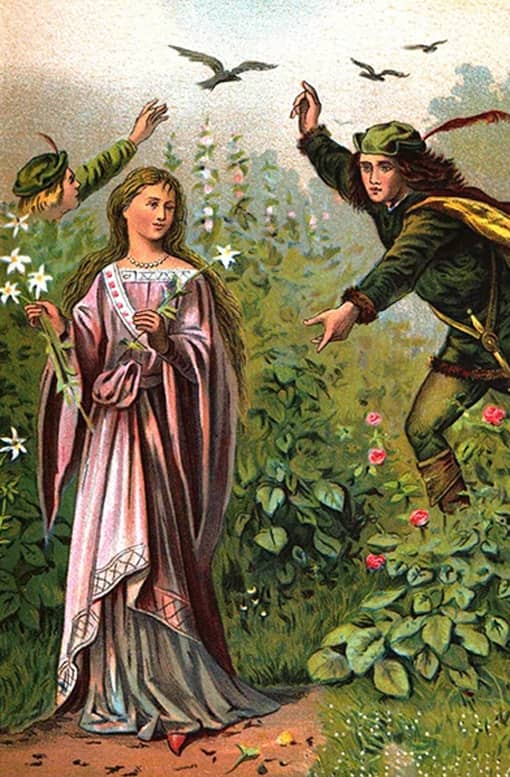
Then said the maiden in her heart, „I know with certainty that I shall set my brothers free,“ and went and sought a high tree and seated herself in it and span, and neither spoke nor laughed. Now it so happened that a king was hunting in the forest, who had a great greyhound which ran to the tree on which the maiden was sitting, and sprang about it, whining, and barking at her. Then the King came by and saw the beautiful King’s daughter with the golden star on her brow, and was so charmed with her beauty that he called to ask her if she would be his wife. She made no answer, but nodded a little with her head. So he climbed up the tree himself, carried her down, placed her on his horse, and bore her home.
Then the wedding was solemnized with great magnificence and rejoicing, but the bride neither spoke nor smiled. When they had lived happily together for a few years, the King’s mother, who was a wicked woman, began to slander the young Queen, and said to the King, „This is a common beggar girl whom thou hast brought back with thee. Who knows what impious tricks she practises secretly! Even if she be dumb, and not able to speak, she still might laugh for once; but those who do not laugh have bad consciences.“ At first the King would not believe it, but the old woman urged this so long, and accused her of so many evil things, that at last the King let himself be persuaded and sentenced her to death.
And now a great fire was lighted in the courtyard in which she was to be burnt, and the King stood above at the window and looked on with tearful eyes, because he still loved her so much. And when she was bound fast to the stake, and the fire was licking at her clothes with its red tongue, the last instant of the seven years expired. Then a whirring sound was heard in the air, and twelve ravens came flying towards the place, and sank downwards, and when they touched the earth they were her twelve brothers, whom she had delivered. They tore the fire asunder, extinguished the flames, set their dear sister free, and kissed and embraced her. And now as she dared to open her mouth and speak, she told the King why she had been dumb, and had never laughed. The King rejoiced when he heard that she was innocent, and they all lived in great unity until their death. The wicked step-mother was taken before the judge, and put into a barrel filled with boiling oil and venomous snakes, and died an evil death.
 Learn languages. Double-tap on a word.Learn languages in context with Childstories.org and Deepl.com.
Learn languages. Double-tap on a word.Learn languages in context with Childstories.org and Deepl.com.Backgrounds
Interpretations
Adaptions
Summary
Abstract
Linguistics
„The Twelve Brothers“ is a German fairy tale collected and published by the Brothers Grimm in their famous compilation, „Grimms‘ Fairy Tales“ or „Kinder- und Hausmärchen“ in 1812. The Brothers Grimm, Jacob and Wilhelm, were German academics and linguists who sought to preserve and document traditional German folklore and stories. The tales in „Grimms‘ Fairy Tales“ were compiled from various oral and written sources, with some stories dating back to ancient times. The Brothers Grimm collected these tales in an effort to preserve the cultural and literary heritage of Germany. As the tales were passed down through generations, they often underwent significant changes, reflecting the beliefs, values, and social norms of the time.
In „The Twelve Brothers,“ a king and queen have twelve sons, but no daughters. The king decides that if a daughter is born, his sons must die to ensure that the daughter inherits the kingdom. He has twelve coffins prepared for his sons and places them in a secret room. However, when the queen gives birth to a daughter, she cannot bear the thought of her sons‘ deaths, so she sends them away to live in a hidden forest house. The princess grows up unaware of her brothers‘ existence. One day, she discovers the twelve coffins and learns about her brothers. Distraught, she sets out to find them in the forest. When she reaches their house, she convinces them to let her stay and help with chores. The siblings live happily together until she accidentally breaks a lily flower, which turns her brothers into ravens.
Determined to save her brothers, the sister goes on a quest to find a way to break the curse. She is told that she must remain silent and not smile or laugh for seven years. She undertakes this difficult task and endures many trials, including being accused of witchcraft and nearly executed. In the end, her perseverance pays off, and her brothers are transformed back into humans. The family is reunited, and they live happily ever after. „The Twelve Brothers“ combines elements of transformation, sacrifice, and familial love, while also incorporating common motifs like the number twelve, which can be found in other stories, such as „The Twelve Dancing Princesses“ and „The Twelve Huntsmen.“ The story highlights themes of perseverance, love, and the power of determination in overcoming adversity.
„The Twelve Brothers“ is classified as Aarne-Thompson-Uther (ATU) Type 451, „The Maiden Who Seeks Her Brothers.“ This type of story is characterized by a girl searching for her brothers, who have been transformed into birds. She must remain silent or perform a difficult task to break the curse and save her brothers. Variants of this tale can be found in many cultures worldwide, such as „The Six Swans“ in European folklore and „The Seven Ravens,“ another tale by the Brothers Grimm. The fairy tale „The Wild Swans“ by Hans Christian Andersen has similarities to „The Twelve Brothers“ as it also features a sister who saves her brothers from a spell that transforms them into birds. The fairy tale itself explores themes like familial love, sacrifice, perseverance, and the struggle between good and evil, as well as showcasing a strong female protagonist who drives the narrative and saves her brothers.
„The Twelve Brothers“ is a rich and complex fairy tale that can be interpreted in various ways. Some key themes and interpretations include.
Sacrifice and love: The story emphasizes the power of sacrifice and love, as the sister willingly puts herself in danger and endures seven years of silence to save her brothers. Her selflessness ultimately breaks the curse and reunites her family.
Loyalty and familial bonds: This tale highlights the importance of loyalty and the strong bond between siblings. Despite the obstacles they face, the brothers and sister remain devoted to each other, ultimately leading to their salvation.
Female resilience and agency: The sister’s courage and determination in seeking her brothers, enduring silence for seven years, and eventually saving them demonstrate her strength and resilience. This interpretation presents a strong female character who takes matters into her own hands and triumphs over adversity.
Consequences of one’s actions: The story serves as a cautionary tale, showing that actions have consequences. The king’s decision to protect his daughter’s inheritance ultimately leads to his sons‘ curse and his family’s separation. The wicked stepmother’s lies and manipulation result in her own horrific death.
The power of perseverance: The sister’s unyielding commitment to her task, despite the challenges and suffering she endures, is a testament to the power of perseverance. This theme teaches readers the importance of staying steadfast in the face of adversity.
The struggle between good and evil: Throughout the story, there is a constant battle between good and evil, represented by the sister and her wicked stepmother. Ultimately, good prevails as the sister saves her brothers and the stepmother faces a gruesome end. This theme reinforces the idea that good will triumph over evil in the end.
The power of familial love: The story demonstrates the strong bond between siblings and the lengths they are willing to go to protect and save each other. Her determination to rescue her brothers, despite the challenges she faces, is a testament to the power of love and loyalty within families.
The consequences of rash decisions: The king’s decision to have his sons killed if a daughter is born sets the stage for the tragic events that unfold. This can be seen as a cautionary tale about the consequences of making hasty and cruel decisions, which can lead to suffering and misfortune.
Perseverance and personal sacrifice: The sister’s willingness to endure seven years of silence and abstain from laughter and smiles to save her brothers highlights the importance of perseverance and self-sacrifice in overcoming adversity. Her dedication to the task and her willingness to suffer for the greater good serve as a powerful example of inner strength and resilience.
The transformative power of love: The story features several instances of transformation, both literal (the brothers turning into ravens) and metaphorical (the characters‘ personal growth and development). These transformations can be seen as a reflection of the power of love to change and heal, ultimately leading to a resolution and happy ending.
The importance of inner strength: Throughout the story, the sister is faced with numerous challenges and obstacles, from the initial separation from her brothers to the trials she endures during her vow of silence. Her inner strength and determination to save her brothers are essential to overcoming these challenges, demonstrating the importance of inner strength in confronting adversity.
Overall, „The Twelve Brothers“ is a complex and engaging tale that can be interpreted on multiple levels. The story’s themes of love, perseverance, and transformation resonate across various cultures and time periods, demonstrating the enduring appeal of this Brothers Grimm fairy tale.
„The Twelve Brothers“ is a fairy tale collected by the Brothers Grimm in their publication „Children’s and Household Tales“ (also known as „Grimm’s Fairy Tales“). „The Twelve Brothers“ fairy tale has been adapted in various forms of media, including books, films, and television shows. While „The Twelve Brothers“ may not be as well-known as some other Grimm fairy tales, it has still inspired several adaptations and references in different media:
Books and retellings: „The Brothers Grimm: Popular Folk Tales“ (1982) by Jacob and Wilhelm Grimm, translated by Carol Mulholland and illustrated by Walter Crane: This collection of Grimm fairy tales includes a retelling of „The Twelve Brothers“ with charming illustrations that bring the story to life. „Twelve Dancing Princesses“ by Jessica Day George: This novel is a retelling of „The Twelve Brothers“ tale, but the focus is on the princesses who sneak out at night to dance in a magical kingdom. „The Twelve Brothers“ by Howard Pyle: This book is a retelling of the tale with detailed illustrations and focuses on the magical transformation of the brothers into birds. „The Twelve Brothers“ by Jacob and Wilhelm Grimm, illustrated by Warwick Goble: This book is a children’s picture book adaptation of the original fairy tale with beautiful illustrations by Warwick Goble.
Animated adaptations: „Grimm’s Fairy Tale Classics“ (1987-1989): This Japanese animated series, also known as „Grimm Masterpiece Theater“ in Japan, adapted numerous Brothers Grimm fairy tales, including „The Twelve Brothers.“ The series offers a family-friendly retelling of the story that maintains the central themes and characters.
Theater and puppet shows: Some smaller theater companies, puppet theaters, and storytelling groups have performed adaptations of „The Twelve Brothers,“ particularly in children’s theater settings. These performances often emphasize the themes of love, perseverance, and transformation while making the story accessible and engaging for young audiences. „The Twelve Brothers“ episode of „Faerie Tale Theater“: This television show adapts the original fairy tale with a star-studded cast, including Jeff Bridges, Anjelica Huston, and Matthew Broderick.
Film adaptations: „The Wild Swans“ (1962): This Soviet animated film, directed by Mikhail Tsekhanovsky, is a loose adaptation of „The Twelve Brothers“ and Hans Christian Andersen’s „The Wild Swans.“ The film combines elements of both stories, focusing on the protagonist’s quest to save her brothers who have been turned into birds. „Brothers of the Wind“ (2015): This Austrian film is a modern adaptation of „The Twelve Brothers“ tale set in the Alps and tells the story of a young boy who befriends an injured eagle.
While „The Twelve Brothers“ may not have as many adaptations as some of the more famous Grimm fairy tales, its themes of love, sacrifice, and perseverance continue to resonate with audiences and inspire new interpretations across various forms of media.
„The Twelve Brothers“ is a Brothers Grimm fairy tale that tells the story of a king and queen who have twelve sons. The king decides that if a daughter is born, his sons must die to ensure that the daughter inherits the kingdom. He prepares twelve coffins for his sons and hides them in a secret room. When the queen gives birth to a daughter, she sends her sons away to a hidden house in the forest to protect them from the king’s cruel plan.
The daughter grows up without knowledge of her brothers. One day, she discovers the secret room with the twelve coffins and learns the truth about her brothers. Distraught, she sets out to find them in the forest. Upon finding their hidden house, she convinces her brothers to let her stay with them, and they live happily together.
One day, she accidentally breaks a lily flower, which turns her brothers into ravens. Determined to save them, she embarks on a quest to break the curse. An old woman tells her that she must remain silent and not smile or laugh for seven years to lift the curse. She accepts the challenge and endures many trials, including being accused of witchcraft and nearly being executed.
After seven years, her dedication and sacrifices pay off, and her brothers are transformed back into humans. The family is reunited, and they live happily ever after, free from the curse and the king’s cruel intentions.
„The Twelve Brothers“ is a fairy tale by Brothers Grimm about a king and queen who have twelve sons. Fearing that their thirteenth child, a daughter, will inherit the kingdom alone, the king orders twelve coffins prepared for his sons. The queen, heartbroken, tells her youngest son, Benjamin, the truth about their father’s plans.
Benjamin and his brothers flee to the forest, vowing vengeance against any girl they meet. They find an empty bewitched hut where Benjamin stays behind to keep house while his brothers hunt for food. Meanwhile, their sister grows up unaware of her brothers‘ existence. When she discovers the truth, she sets off to find them.
Upon finding the hut, the sister and Benjamin recognize each other. One day, she picks twelve lily flowers, which unknowingly transforms her brothers into ravens. A kind old woman informs her that she can only break the curse by remaining silent for seven years. To save her brothers, she remains hidden and promises not to speak or laugh for seven years.
A king discovers the girl, marries her, and takes her back to his kingdom. The king’s wicked mother, however, slanders the queen and eventually convinces the king to sentence her to death. As the queen is about to be burned at the stake, the seven years of silence end, and her brothers arrive as ravens, breaking the curse. They save their sister, who explains her silence to her husband. They live happily ever after, while the wicked stepmother meets a gruesome end.
Linguistic analysis of fairy tales like „The Twelve Brothers“ by the Brothers Grimm can reveal much about the narrative style, cultural values, and linguistic features of the time. Let’s explore some key aspects of the language and narrative structure in this tale:
Narrative Structure: The story follows a classic structure of introduction, conflict, climax, and resolution. This linear structure is filled with quests, magical transformations, and eventual justice, typical of fairy tale narratives. The use of repetitive elements, such as the twelve brothers and the tasks they undertake, reinforces the rhythmic and oral storytelling tradition from which many fairy tales originate.
Characterization: Characters are often archetypal and named according to their familial roles or symbolic significance (e. g. , Benjamin, the youngest son). The maiden’s role transitions from a passive princess to an active savior, embodying virtue and resilience. The moral dichotomy between good and evil is strongly present, with characters like the wicked stepmother contrasting sharply with the virtuous maiden.
Symbolism: Symbolic elements such as the twelve coffins, a white and red flag, and the transformation of brothers into ravens serve multiple narrative purposes. They are emblematic of death, purity, danger, and enchantment, respectively. The golden star on the maiden’s forehead symbolizes her royal lineage and purity, a common motif in fairy tales that emphasizes inherent nobility and worth.
Themes and Motifs: Common fairy tale themes such as sacrifice, loyalty, and the triumph of good over evil are prevalent. The maiden’s silence symbolizes sacrifice, while her brothers‘ transformation and their eventual restoration represent redemption and familial unity. The motif of spells and transformations (e. g. , brothers into ravens) is a recurring element in fairy tales that adds magical and fantastical dimensions to the narrative.
Language and Style: The language is straightforward and clear, suitable for oral storytelling. It uses direct dialogue and concise descriptions to maintain a narrative flow. The use of archaic language and formal address („thou,“ „bade her not to speak“) lends the story an antiquated and timeless quality, characteristic of the Brothers Grimm’s style.
Moral Lessons: The tale imparts lessons on bravery, family loyalty, and the importance of perseverance. The maiden’s silence highlights the virtues of patience and determination. The ending delivers justice with the punishment of the wicked stepmother, reinforcing the moral that evil deeds ultimately lead to downfall.
Overall, „The Twelve Brothers“ is rich in linguistic and cultural elements that reflect societal values and the storytelling methods of its era. These elements combine to create a narrative that continues to resonate through its exploration of universal themes and engaging use of language.
Information for scientific analysis
Fairy tale statistics | Value |
|---|---|
| Number | KHM 9 |
| Aarne-Thompson-Uther-Index | ATU Typ 451 |
| Translations | DE, EN, DA, ES, FR, PT, FI, HU, IT, JA, NL, PL, RU, TR, VI, ZH |
| Readability Index by Björnsson | 35.3 |
| Flesch-Reading-Ease Index | 76.4 |
| Flesch–Kincaid Grade-Level | 8.5 |
| Gunning Fog Index | 11.1 |
| Coleman–Liau Index | 8.4 |
| SMOG Index | 9.3 |
| Automated Readability Index | 9.7 |
| Character Count | 10.567 |
| Letter Count | 8.142 |
| Sentence Count | 84 |
| Word Count | 1.982 |
| Average Words per Sentence | 23,60 |
| Words with more than 6 letters | 231 |
| Percentage of long words | 11.7% |
| Number of Syllables | 2.495 |
| Average Syllables per Word | 1,26 |
| Words with three Syllables | 93 |
| Percentage Words with three Syllables | 4.7% |
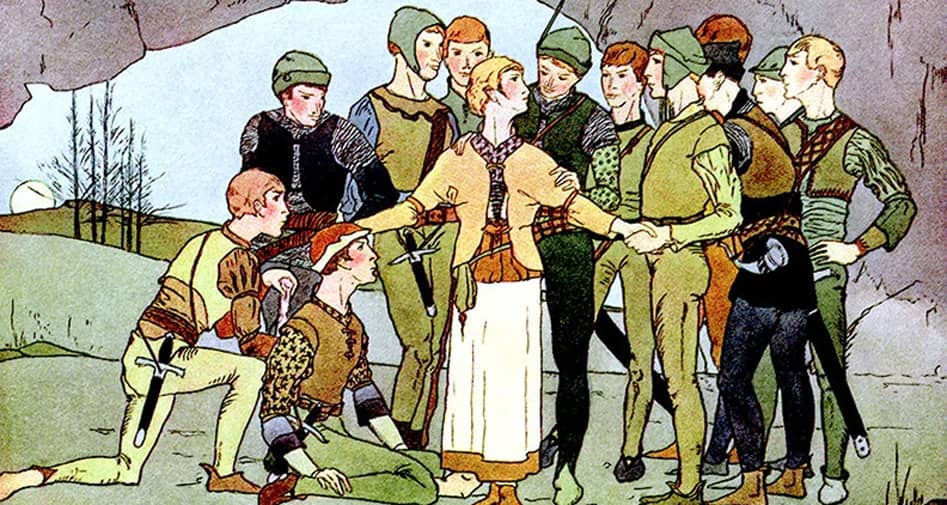
 Facebook
Facebook  Whatsapp
Whatsapp  Messenger
Messenger  Telegram
Telegram Reddit
Reddit